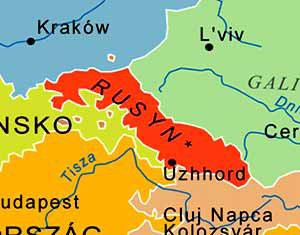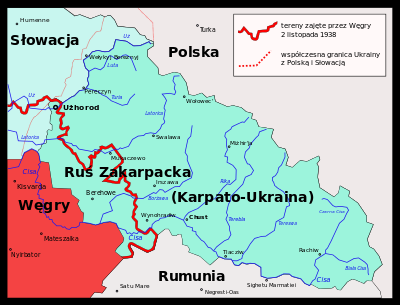lundi, 19 mai 2014
Carpathian Hungarians Demand Autonomy
Carpathian Hungarians Demand Autonomy
|
Ex: http://www.strategic-culture.org |
|
Hungarians try to defend their language and culture since the very first days of Ukrainian independence. The Kiev government has turned a deaf ear to their demands. The Carpathian Hungarians and Ruthenians (Ruthene or Rusyn) have been under pressure of “Ukrainization” for over twenty years. The both peoples strive for extending their rights, The Ruthenians are forbidden to even mention the idea of national identity or self-determination instead of becoming Ukrainians. The Ukrainian Hungarians and Ruthenians normally struggle side by side. Ruthenians have their own history of relationship with Hungary and Ukraine. They had lived over a thousand years in Hungary becoming part of Ukraine only in 1944. In Hungary they had their own schools which taught in their native language. The schools were closed during the times of the Soviet Union as well as after its collapse. In Ukraine they have gone through waves of political repressions at least twice. The Carpathian Ukraine was established on March 14, 1939 and Nazi henchman Avgustin Voloshin became its President. He was notorious for throwing into concentration camps all Rutheinians who refused to recognize themselves as Ukrainians. This historic fact did not add sympathy towards Ukraine. In 2002 by the decree of the then Ukrainian President Leonid Kuchma Avgustyn Voloshyn was awarded the title of the Hero of Ukraine and given the Order of State posthumously. On December 1, 1991 the Transcarpathian Regional referendum was held simultaneously with the all-Ukraine referendum on state independence, 78, 8% supported the creation of a special self-governed territory of Transcarpathia outside of any other territorial and administrative entities. The very same day another local referendum was held on giving the Beregovo town area of Transcarpathia a status of Hungarian autonomous district (two thirds out of 85 thousand dwellers are Hungarians by origin). 81, 4% of adult population said yes. Today the results of those two local referendums constitute a legal basis for putting forward the demands of local population. The ruling FIDESZ and the Hungarian nationalist political party Jobbik headed by Gábor Vona are among the most active defenders of Hungarians living abroad. They have many times criticized the Ukrainian authorities for wrong treatment of Transcarpathian Hungarians. They want Kiev to create a Hungarian autonomy in the Tisza region. Visiting the Moscow State University in 2013 Gábor Vona said Russia defends European traditions while the European Union betrays them.
The movement for self-determination of Ukrainian South-East inspired Hungarians in their struggle for autonomy. The movement is not instigated by foreign “saboteurs” as the Kiev propaganda keeps on saying, but rather by nationalism of the putschists’ regime stubbornly refusing to recognize the fact that Ukraine is a multinational state. The Hungarian and Ruthenian issues are intertwined the same way as the peoples’ histories have a lot in common. They would better be tackled together but Kiev has no experience, nor resources, nor wish to find a solution to the problems of minorities. The plight of Hungarians in Ukraine has moved to the fore of Budapest’s foreign policy agenda. Speaking at the Bratislava international security conference on May 15, Victor Orban said Ukraine provides no democratic guarantees, it has no economic plan for economic development and is a challenge to the European Union. Experts are sure that Budapest will not let the issue of national minorities in Ukraine, first of all the peoples of Transcarpathia, become a forgotten issue. |
00:05 Publié dans Actualité, Affaires européennes, Terres d'Europe | Lien permanent | Commentaires (0) | Tags : ukraine, politique internationale, minorités hongroises, hongrie, europe, affaires européennes, minorités, ukraine subcarpatique |  |
|  del.icio.us |
del.icio.us |  |
|  Digg |
Digg | ![]() Facebook
Facebook



 For a long time the fate of ethnic Hungarians in neighboring countries has long been a delicate issue for Hungary. The Victor Orban's government has allowed many of them to obtain Hungarian citizenship and vote in Hungarian elections. «Hungarians of the Carpathian Basin are entitled to dual citizenship, community rights and autonomy», the Hungarian Prime Minister said on May 10, «This is the stance we will represent in international politics.» According to him, the issue of ethnic Hungarians was especially topical due to the situation in neighboring Ukraine, where around 200,000 ethnic Hungarians live, who are entitled to Hungarian citizenship and also the right to self-administration. «This is our clear expectation from the new Ukraine which is taking shape now», Orban said... It’s not just a personal opinion of someone who heads a neighboring state. The concern over the fate of Carpathian Hungarians is widely spread in Hungary. These sentiments are fuelled by pictures of civilians being shot at by Ukraine’s interim government troops in Donbass.
For a long time the fate of ethnic Hungarians in neighboring countries has long been a delicate issue for Hungary. The Victor Orban's government has allowed many of them to obtain Hungarian citizenship and vote in Hungarian elections. «Hungarians of the Carpathian Basin are entitled to dual citizenship, community rights and autonomy», the Hungarian Prime Minister said on May 10, «This is the stance we will represent in international politics.» According to him, the issue of ethnic Hungarians was especially topical due to the situation in neighboring Ukraine, where around 200,000 ethnic Hungarians live, who are entitled to Hungarian citizenship and also the right to self-administration. «This is our clear expectation from the new Ukraine which is taking shape now», Orban said... It’s not just a personal opinion of someone who heads a neighboring state. The concern over the fate of Carpathian Hungarians is widely spread in Hungary. These sentiments are fuelled by pictures of civilians being shot at by Ukraine’s interim government troops in Donbass. 
Les commentaires sont fermés.